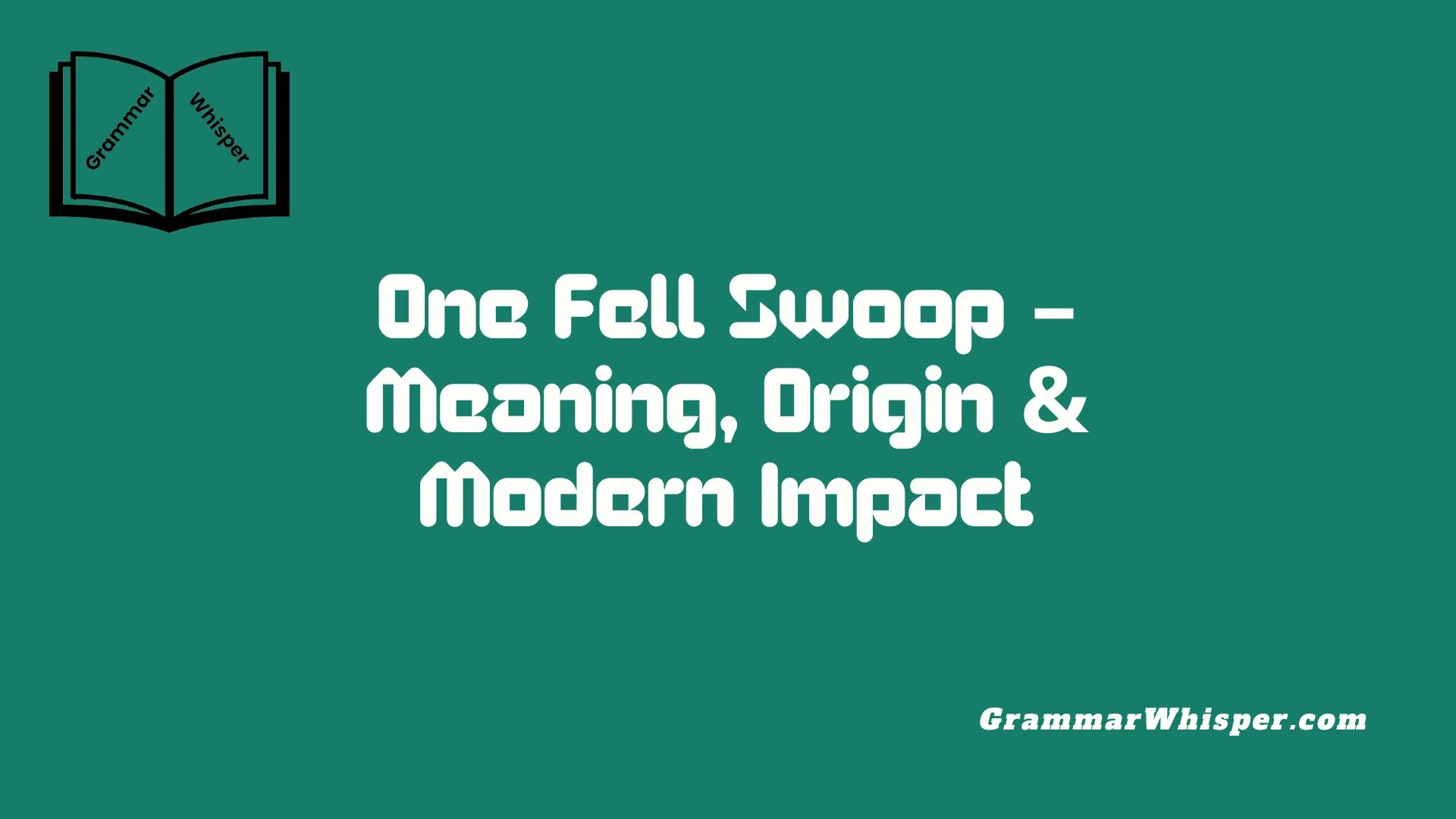You might hear someone say “it all happened in one fell swoop” and instantly feel the weight of the words. This idiom, born in 1606 through Shakespeare’s play Macbeth, is still packed with drama, urgency, and poetic power. I once sat in a boardroom, mid-chat, when the phrase came up. It described a sudden collapse of a deal so well that it hit with the same impact as a headline. From casual conversation to breaking news, this old phrase carries a timeless sense of emotional depth.
Even in modern times, the phrase stands tall. Today, in our fast-moving daily lives, everything can seem fine one moment and then shift the next – like the floor just got pulled out from under you. It’s more than just a fancy expression; it’s a living, breathing part of language. Its strength lies in how it connects the shock of change to shared human experience. And knowing it was crafted, not just written, in Macbeth, gives it a timeless quality built to last centuries.
What “One Fell Swoop” Means Today
At its core, one fell swoop describes a significant change – or loss – that happens suddenly and completely.
- It denotes dramatic impact, often unexpected.
- It can carry positive meaning (“I learned everything in one fell swoop”) or negative (“The layoffs hit in one fell swoop”).
- The idiom conveys immediacy: not gradually, but as a sudden event.
Why it matters now: Email subject lines, tweets, and speeches use it to grab attention. It signals a moment of transformation – sometimes disruptive, sometimes enlightening.
The Shakespearean Connection: Macbeth’s Tragedy
In Macbeth (Act 4, Scene 3), the phrase appears as Macbeth plans to murder Macduff’s family “in one fell swoop”.
- “Fell” here means fierce or deadly.
- Shakespeare used it to evoke ruthless violence, not casual change.
That gives the idiom its dramatic punch. Today, it retains a hint of that tragedy – especially when used to describe powerful or sweeping actions.
Etymology: What Do “Fell” and “Swoop” Mean?
Fell
- Originally meant “deadly, cruel, fierce” in late Middle English.
- Examples: “The fell beast unleashed havoc.”
Swoop
- Comes from late 1500s, suggesting a swift plunge or descent.
- Think of birds swooping down to catch prey.
Together, the words paint a vivid image: a violent, swift strike from above.
How “One Fell Swoop” Evolved Over Time
The idiom has transformed significantly since 1606. Here’s how usage shifted:
| Era | Typical Use | Tone |
| Shakespearean | Violent, literal tragedy | Grave, ruthless |
| 1800s–1900s | Literary references, poetic dramatic scenes | Formal, elevated |
| 1950s–2000s | Journalism, speeches, casual conversation | Descriptive, varied |
| Today | Tech, business, pop culture, social media | Attention-grabbing |
These shifts show the idiom’s journey from dramatic intensity to everyday verbal tool.
Common Misinterpretations and Malapropisms
Even well-read writers sometimes get the idiom wrong. Here are frequent mistakes:
- One foul swoop – suggests dirtiness, not ferocity
- One fowl swoop – evokes birds, not destruction
- One full swoop – weird overlap of “full” and “fell”
These errors arise from unfamiliarity with the archaic adjective or casual phonetic confusion. Stick with fell to retain original meaning.
“One Fell Swoop” in Modern Usage
Let’s look at real examples of this idiom in action:
- News headline: “Company announces layoffs in one fell swoop – 500 employees laid off.”
- Business pitch: “We solved their supply issue in one fell swoop with our new platform.”
- Social media: “Cleaned apartment, filed taxes, and booked flight all in one fell swoop!”
Each use shows how the phrase signals swift, decisive change – whether dramatic or mundane.
Comparing Idioms: Alternatives and Nuances
Sometimes “one fell swoop” may feel too dramatic. Here are softer alternatives and when to use them:
| Idiom | Usage Example | Tone |
| In one go | “Finished the report in one go.” | Efficient, calm |
| At a single stroke | “Solved the problem at a single stroke.” | Slightly poetic |
| All at once | “The renovations hit all at once.” | Neutral, descriptive |
The table helps you choose based on tone and impact.
Preposition Shift: At vs. In
You’ll see both “at one fell swoop” and “in one fell swoop.” What’s correct?
- In one fell swoop is more common now – suggesting something happening within that moment.
- At one fell swoop is acceptable but less frequently used.
They’ve become interchangeable over time, but “in” feels more natural to modern ears.
Cultural Weight: Why It Still Resonates
There’s something visceral about this idiom.
- It captures attention
- It promises drama or change
- It links modern speech to Shakespeare’s emotional power
Writers and speakers use it to tap into that legacy – giving their message more punch.
Visualizing “One Fell Swoop”
Here’s a simple comparison:
css
CopyEdit
[ Literal ] → An eagle dives, kills its prey, lifts off
[ Idiomatic ] → A sudden change, event, or realization
Emotionally, it resonates like a drumbeat – it signals sudden impact.
Final Thoughts
The idiom “one fell swoop” might sound like poetic fluff at first, but it’s anything but. With roots in Shakespearean tragedy, it has evolved into a powerful linguistic tool used to express sudden, sweeping actions – both devastating and triumphant. Whether you’re describing corporate decisions, life changes, or social shifts, this phrase gives your language the dramatic flair to grab attention and convey intensity. The key is in understanding not just its origin or structure, but its emotional impact. When used well, it condenses complexity into a single, memorable moment. And that’s the beauty of it – in one fell swoop, it says everything.
FAQs
What does “one fell swoop” mean?
It refers to a sudden, swift, and often dramatic action or event that occurs all at once. The idiom emphasizes the immediacy and totality of the change.
Where did the phrase originate?
The phrase comes from William Shakespeare’s play Macbeth (1606), where “fell” meant fierce or deadly, and “swoop” suggested a bird of prey diving onto its victim.
Is “one fell swoop” always negative?
No. Although it originated in a tragic context, today it’s often used in neutral or even positive scenarios – like completing multiple tasks efficiently or making sweeping improvements.
What’s the difference between “fell,” “foul,” and “fowl” in this phrase?
- Fell = correct, meaning fierce or deadly.
- Foul = wrong, implies something dirty or unpleasant.
- Fowl = also wrong, refers to birds. Only “one fell swoop” is the proper usage.
Can I use “one fell swoop” in business writing?
Absolutely. It’s especially effective in presentations, strategic reports, or executive summaries where you want to highlight big, swift changes or decisions. Just make sure your audience is familiar with idiomatic expressions.











